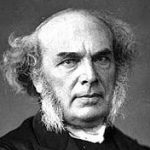This is the first of a series of “bloggersations” that I hope to publish here over the next several months. One of the vitally important dimensions to the resurgence of gospel unity that is developing within and beyond the SBC is the establishment of friendships. Too often, brothers who disagree with each other talk past one another rather than constructively to each other. When there is no vital relationship it is easy to traffic in caricature or to allow misconceptions to go unchallenged. But where the respect engendered by friendship exists, those destructive tendencies are not tolerated.
It has been my joy to get to know Dr. Alvin Reid over the last year and to be able to call him my friend. He is a Professor of Evangelism and Student Ministry at Southeastern Baptist Theological Seminary in Wake Forest, North Carolina. As you will read below, our friendship developed because he initiated it. His example should encourage all who love Christ and His gospel to reach out to others to establish gospel-centered friendships. As Alvin and I have traded emails, tweets and phone calls, it began to dawn on me that aspects of our conversations might be of interest and perhaps useful to others. The idea of blogging part of a conversation dawned on me a few months ago, and Alvin quickly agreed to participate. What follows is a bloggersation between Alvin and me about the 2009 SBC and our friendship.
What happened at the SBC this year?
AR:While I agree with Jonathan Edwards that one should best judge a movement a posteriori than a priori, i.e., by its fruits, I believe we can say that the meeting in Louisville was of historic proportions. I wrote of this at my website, but in a nutshell it said we (in no certain order): 1) said to a coming generation of younger men of God that we believe in them and the future; 2) affirmed the call for a Great Commission Resurgence with an overwhelming voice; 3) affirmed wholeheartedly the leadership of men like Johnny Hunt, Danny Akin, and Al Mohler among others; 4) said as a body we will not focus on secondary issues of disagreement but come together to strive to fulfill the great commission; 5) proved we can differ on matters such as Calvinism, eschatology, etc, and yet bind together as a people for the glory of God and the sake of the gospel.
For me, it was every bit as historic as Dallas in 1995, my first SBC.
TA: I came away more encouraged from this convention than from any of the others that I have attended, going all the way back to 1979. There were several elements that combined to bring this about. First, God is giving us the kind of leaders that we need for this new day. Johnny Hunt’s grace and spirit is contagious and I sense that lots of those who attended–me included–want to catch whatever it is that he has! Danny Akin’s leadership resonated with the convention as he chaired the Resolutions Committee without a glitch and spoke in 4 different forums on Tuesday. Al Mohler’s motion to have a task force appointed, and Frank Page’s timely support of that motion signaled a new spirit of cooperation that many Southern Baptists have been longing for.
How do you account for what took place?
AR:I certainly think it was God at work, although I try to be careful to speak for God beyond what He clearly reveals in His Word. I also think it came as a convergence of many factors, signified first in Frank Page’s election, and from where I sit this was the culmination of what I had been hearing for three years as I travel around the SBC: a general sense of unrest, that culture has changed and we have not been willing to adapt to reach this culture (adapt methods not our message which is unchanging). I have spent my entire life studying movements, and this has all the marks of a growing movement. I am praying for a revolution of gospel-saturated believers who will live as missionaries in our increasingly unchurched and dechurched world. Add to that a flattened world where we can gain information and communicate more easily, and the sense that we are not doing our best to serve the Lord God has been reaching a crescendo.
TA: I think Alvin has a good take on this. There is a growing unrest that began years ago in the SBC. I think the rising generation has added energy and passion to that unrest that is now forcing some vitally important issues to be addressed. The informational gatekeepers have been forever circumvented by the new media. I think the last 2 SBC presidential elections have signaled the strength of the new winds that are blowing. So in one sense, I think the recent SBC in Louisville represents the next step in this development. Enough Southern Baptists are now willing to admit that we have real problems that cannot be solved by more cheerleading or doing more of the same. We need to get honest and start caring about not only the authority of Scripture but its sufficiency.
How did you guys become friends?
TA: Twitter. For real. On November 8, 2008, Alvin sent me a Direct Message saying, “We have never met personally…I would love to interact with you by email.” Less than two hours later I received a warm, lengthy email with the subject heading: “Hello my brother.” He told me a little about himself and said that he wanted to get to know me better and hopefully enjoy fellowship in the future. I had read some of Alvin’s writings and appreciated his insights into and love of revivals and awakenings. But, to my shame, had he waited on me to reach out to him we would not be friends today.
The fact that he had gone out of his way to establish some interaction with me intrigued me and engendered an immediate respect and appreciation for him. As we corresponded back and forth and talked on the phone I came to discover what many people have known about Alvin for years–that he is hard not to love! I am very grateful to the Lord for his friendship. Alvin is sold out to the gospel of Christ and is a passionate evangelist. I have a lot to learn from him.
AR: I had forgotten who took the initiative, but I am glad I did. I think our friendship is a great example of how God has been working in hearts. There are new coalitions and constituencies forming around biblical unity centered on the gospel, and less on certain causes some support. To be perfectly honest, I am not sure I was ready to be good friends with a brother in Christ who also led the Founders Ministry five or more years ago. But we began to converse via email, and then on the phone a couple of times. We finally met for lunch this past April near Tom’s area when I was there preaching.
Let me unpack what I said about where I was five years ago to now. Most of my friends were not Calvinists all through college and seminary. The occasional Calvinist I met typically wanted to tell me (since evangelism is obviously a big deal to me) everything wrong with evangelism, but never seemed to offer ways they sought to fulfill the great commission. This would be a total of a handful of people. Then on occasion I would get to know men of God of a Calvinist bent who also loved the gospel. Mark Coppenger hired me in Indiana out of seminary. I went door-to-door on several occasions with this Calvinist brother who was both brilliant and not snotty :-). I realized that I too can stereotype others even as some have stereotyped me!
Then I began to be consis
tent (not a bad idea). I love Edwards. And Whitefield, Carey, Spurgeon, etc. I also love Wesley and Graham. But while I could love the many Calvinists God used in the history of revival and evangelism, I had more disdain than affection for my contemporaries who were Calvinists.
And then I met Nathan Finn. Nathan was in my PhD seminar. I had no idea who he was. I soon learned two things. First, he knew history a lot better than I did. Second, he was truly humble about it. He and some others in the seminar who shared a more Reformed theology helped to make the seminar a delight. I realized that there seemed to be a growing number of Calvinists who were serious about the Great Commission, in the heritage of Andrew Fuller and Carey.
Finally, I watched my president, Danny Akin, who like me is not a Calvinist but who takes seriously the sovereignty of God and His work in salvation without affirming all five points. He has become a model for building bridges for all who love the gospel. Let’s be honest; I have known plenty of non-Calvinists who never share Christ. So like Akin, I would submit that the believer who is not serious about the great commission is in rebellion before God, whatever his “ism”.
So by the time Tom and I met I had been on a journey that led me to love Calvinists today who love the gospel as much as Edwards and Spurgeon of old. I can learn much from Tim Keller today about reaching the cities as I can from Samuel Mills and Carey who longed to reach the nations.
Where are your doctrinal agreements and disagreements?
TA: Other than the fact that I am a hyper-Calvinist and Alvin is a Pelagian, we really see eye-to-eye on theological issues. 🙂 Seriously, those kinds of caricatures are what too-often become the default judgment of men who disagree on certain points of the doctrine of salvation. When they are unjustifiably harbored, communication and relationship inevitably break down.
Alvin and I have not talked at length about the details of our doctrinal convictions. We could, and I am sure at some point we will, and it won’t endanger our friendship, because we are in great agreement on so much. We both believe in the sovereignty of God, the depravity of people by nature, substitutionary atonement, perseverance of the saints, that faith and repentance are duties, along with all the other orthodox Christological and Trinitarian doctrines.
I would assume that we disagree on the extent of the atonement, though I certainly affirm universal dimensions to the definite atoning work of Jesus and I would suspect (though we have not talked about it) that Alvin sees limitations to the saving benefits of Christ’s atoning work. We could have a profitable conversation about that without dismissing each other as heretics.
AR: I think Tom articulated this very well. I have spent my life teaching applied theology. In other words, I care little what one says he believes if how he lives does not back that up. So what drives me is the practice of one’s faith, which is why Paul is such a remarkable example to this day. He was both a brilliant theologian and a remarkable practitioner. That is why the conversations I have had with Tom and others on his staff have focused on how we practice the theology we affirm. And, the more we talk about practice, the less we seem to divide. I suspect if we talked more about theology apart from practice we may find increasing disagreement. But as I said above, whether you call yourself a Calvinist, a non-Calvinist, a simple biblicist, a compatibalist, or another word bigger than mayonnaise, if your life does not demonstrate a heart for the gospel and a burden for the lost, your theology or mine needs work. But the shrill stereotypes, “Calvinists do not witness,” or “non-Calvinists have abandoned the gospel,” help no one. Such rhetoric can gain a collection of followers, but hardly resembles a yearning for biblical unity.
Aren’t you at least a little bit suspicious of each other?
TA: No. I have come to see some of Alvin’s heart and what I have seen I love. His tireless investment in students and relentless efforts to make disciples of Jesus convicts and challenges me to follow Christ more diligently. So I have no reason to be suspicious of him and many reasons to have great confidence in him.
AR: I am not at all. I once was somewhat. See, full disclosure :-). But I have discovered we trust those more whom we get to know best, if there is a shared love for God and His truth. I can speak for the Tom Ascol I know now, as I did not know him in the past, but the Tom I know now I am convinced has a great heart for the nations and a desire to see the gospel proclaimed. Let me take a taxonomy from one of my favorite philosophers, Aristotle, who wrote in his Nichomachean Ethics about three kinds of friendships:
1) utility–friendships formed because we find one another useful for a task or agenda.
2) pleasure–we enjoy merriment and humor.
3) perfect friendship–common virtue, a common conviction.
I use this because I have found a few (very few) cases in SBC life where what I thought were close friendships were actually utilitarian–I was considered a friend as long as I promoted the agenda of certain friends. Such friendships are not as deep as we sometimes believe. But I am finding that most of my lifelong friends, and more recent friends like Tom, have become the third type of friendship. Our desire to see Christ exalted, the gospel proclaimed, churches planted, and God’s truth taught, are far more important than other matters than seem quite vital to others.
I guess I would say finally that the common virtue we share is not only for the Word and the gospel, but there is a great sense of urgency. Tom has a daughter serving in a far away land for the gospel. My president, Danny Akin, has two children doing the same thing. This is not a theoretical or even a utilitarian connection. We are driven by a sense of urgency for a world lost and in need of Christ Who alone can save.
We not only should join together for the gospel, we must!

















